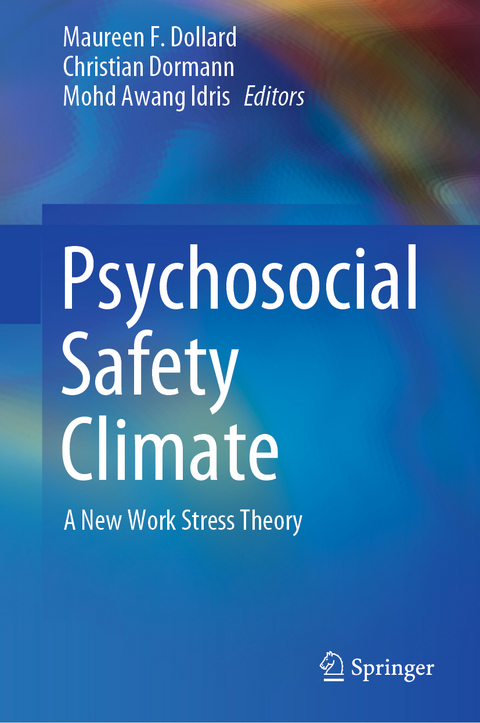
Psychosocial Safety Climate
Springer International Publishing (Verlag)
978-3-030-20318-4 (ISBN)
Maureen Dollard is Professor of Work and Organisational Psychology, Co-Director Centre for Workplace Excellence, Director and Head of the Asia Pacific Centre for Work Health and Safety, a World Health Organization Collaborating Centre for Occupational Health at the University of South Australia. She is a Board Member, International Commission of Occupational Health (ICOH), Foundation President of the Asia Pacific Academy for Psychosocial Factors at Work, and former Co-chair of the ICOH-Work Organisation and Psychosocial Factors (WOPS), Scientific Committee. She was chair of the ICOH-WOPS conference in Adelaide September 2014. She established a national surveillance system of psychosocial (stress) factors at work, The Australian Workplace Barometer, and the StressCafé. Christian Dormann is Professor of Business Education & Management at the Johannes Gutenberg-University Mainz, Germany. Since 2011, Christian Dormann has also been adjunct research professor at the School of Psychology, Social Work and Social Policy at the University of South Australia (UNISA). He also served as an editor of the European Journal of Work and Organizational Psychology and as associate and consulting editor of several other journals, including the Journal of Occupational and Organizational Psychology, Journal of Organizational Behavior, and Journal of Occupational Health Psychology. His research focus is on stress in organisations. In particular, he has been interested in psychosocial aspects of work.
Part 1: Psychosocial safety climate: Theory, measurement and practical implications.- Chapter 1. Psychosocial Safety Climate as a new work stress theory and method implications (Maureen F Dollard).- Chapter 2. A Review of PSC Evidence (Amy Zadow).- Chapter 3. The PSC-4; A short PSC tool (Maureen F Dollard).- Chapter 4. The PSC-15; Expanded Dimensions (Maureen F Dollard).- Chapter 5. The PSC-12; Malaysian and Indonesian version (Mohd Awang Idris, Yulita).- Chapter 6. An Approach to Developing the PSC tool by Cognitive Interviewing (Michael Ertel).- Part 2 : Impacts of PSC on Workers (Cognitive decline, mental health problems, boredom, personal initiative and engagement).- Chapter 7. PSC and Work Quality impact on Cognitive Decline (Ashlee Wilton).- Chapter 8. sychosocial Safety Climate and Mental Health Problems (Maureen Dollard).- Chapter 9. Psychosocial safety climate and job demands-resources: A multilevel study predicting boredom (Valdrin Krasniqi).- Chapter 10. PSC in the Private Sector: Predicting Personal Initiative and Engagement via Personal Development (Michelle Chin Chin Lee).- Part 3 : PSC in different occupations (e.g. policing, humanitarian workers, university workers).- Chapter 11. The effects of Psychosocial Safety Climate on Health and Work in Police Officers (Levi James McCusker).- Chapter 12. Psychosocial Safety Climate as Organisational Resilience: Implications for Worker Psychological Health, Resilience, and Engagement (Carly Taylor).- Chapter 13. A Qualitative Investigation into High Psychosocial Safety Climate University Groups (Rachael Potter).- Part 4. PSC in different countries (e.g., Taiwan, Mexico, Iran, Malaysia).- Chapter 14. Psychosocial safety climate, psychosocial work conditions and employees' wellbeing: empirical findings from Taiwan (Yawen Cheng).- Chapter 15. A validation of the PSC-12 in Mexican workers (Horacio Tovalin Ahumada).- Chapter 16. Psychosocial Safety Climate and PSC Strength; Direct and Interaction effects on Mental Health issues and Work Engagement (Iran) (Afsharian).- Chapter 17. Psychosocial safety climate in Malaysian schools: A multilevel study predicting work and individual outcomes (Nor Shafiza Abdullah).- Part 5. Interventions and Policy Implications (Canada, Sweden, Australia).- Chapter 18. Factors influencing management practices in workplace health interventions (Caroline Biron).- Chapter 19. Team coaching and psychosocial risk assessments, learnings for the future (Sweden) (Rachael Berglund).- Chapter 20. PSC and National Policy (Tessa Bailey).- Chapter 21. Conclusion.
| Erscheinungsdatum | 04.09.2019 |
|---|---|
| Zusatzinfo | XVII, 449 p. 45 illus., 21 illus. in color. |
| Verlagsort | Cham |
| Sprache | englisch |
| Maße | 155 x 235 mm |
| Gewicht | 859 g |
| Themenwelt | Geisteswissenschaften ► Psychologie ► Arbeits- und Organisationspsychologie |
| Medizin / Pharmazie ► Medizinische Fachgebiete ► Psychiatrie / Psychotherapie | |
| Studium ► Querschnittsbereiche ► Prävention / Gesundheitsförderung | |
| Sozialwissenschaften ► Soziologie | |
| Wirtschaft ► Betriebswirtschaft / Management ► Personalwesen | |
| Schlagworte | Engagement • Measurement • Occupational Health Management • Psychosocial risk • Psychosocial Safety Climate • Work Stress |
| ISBN-10 | 3-030-20318-2 / 3030203182 |
| ISBN-13 | 978-3-030-20318-4 / 9783030203184 |
| Zustand | Neuware |
| Haben Sie eine Frage zum Produkt? |
aus dem Bereich


